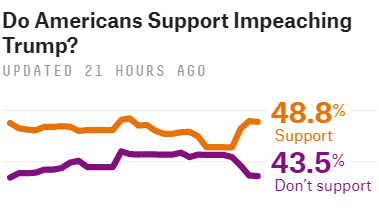... the simplest explanation is that Nixon didn’t survive because his second term featured a series of economic shocks — summarized on Twitter by the political theorist Jacob Levy as “an oil crisis, a stock market crash, stagflation and recession” — while Clinton’s second term was the most recent peak of American power, pride and optimism. In a given impeachment debate, under this theory, neither the nature of the crimes nor the state of the political parties matter as much as whether an embattled president is seen as presiding over stability or crisis, over good times or potential ruin.Douthat (b. 1979) is understating the case. Consider what had happened in the ten years prior to the first Watergate hearings in 1973: the assassinations of two Kennedys and Martin Luther King; a growing quagmire in Vietnam, accompanied by a protest movement that sometimes turned violent (and sometimes had violence directed at it, as at Kent State); unrest in the cities; a youth culture that was experimenting with drugs, sex, odd clothes and hairstyles and music, and rejection of traditional values; Woodstock; Altamont; Charles Manson; Patty Hearst's kidnapping (which took place six months before Nixon resigned) ... cue that Buffalo Springfield song.
And yet with all that going on -- hey, how much worse could things get if there's another national crisis? -- support for Nixon's impeachment and removal remained under 40% for months after the start of the Watergate hearings.

Whereas now, according to FiveThirtyEight ...

Douthat makes the case for the times being too good for a successful impeachment:
... one reason Trump managed to get elected was that the waning years of Barack Obama’s second term felt chaotic and dangerous across multiple fronts — with the rise of the Islamic State, the Russian seizure of Crimea and the Ukrainian quasi-war, a modest increase in crime and a series of terrorist attacks domestically, and a version of the child migrant crisis that has recurred under Trump.AP found some voters in Wisconsin who sound like this:
... the late-Obama-era crime increase appears to have subsided, campuses and cities have been relatively calm, Russia’s aggression has given way to stalemate, the Islamic State’s defeat has been mostly completed and Islamist terrorism has grown more sporadic than in the period that gave us Charlie Hebdo, San Bernardino and much more. Meanwhile the economy has grown steadily, leaving a majority of Americans in their best financial position since the days when Clinton survived impeachment.
... These are voters who dislike Trump but give him some grudging credit for the solid economy and the absence of new foreign wars, voters who don’t support his policies but don’t share the educated-liberal revulsion at his style, and voters whose reluctant support is contingent on Trumpian chaos seeming confined to Washington.
“He’s probably guilty of something. ... I thought he might run into problems because it’s just the way he is,” said Scott Davis, a 67-year-old landscaper from Sturtevant, a manufacturing town that’s a key base for Republican votes in the county.But Yastreblyansky has the counterargument:
But Davis said his business has flourished, and he lauded Trump’s handling of the economy. Controversies or not, Davis said he sees no reason not to support the president in 2020.
“In a lot of ways, (Trump’s) not suited to be president, but he’s done a lot of good for the country,” Davis said. “I would probably vote for him again, just because of the economy.”
David Titus, a 68-year-old retired banker from just outside Racine, said Trump “runs his mouth too much,” but he’s still satisfied with the president’s performance.
“I like what he’s done. I don’t like the way he’s doing it,” he said.
... I think the crisis is here. We're in the middle of a foreign-policy catastrophe brought on, precisely, by Trump's corruption and the narcissism that leads him to base decisions on who flatters him the best, the paralyzing of international organizations and projects as the US becomes unable to participate in them, the increasing effrontery of bad actors in Russia, Turkey, Saudi Arabia, Israel, China, and others who have Trump's number and use it, and so on. I think we're in a terrible economic situation as well even though the favorite indicators don't show it, with the agricultural and manufacturing economy collapsing under the Trump tariff wars while our imports don't slow down, but who knows how long that takes. We should all be worried about the increasingly uniform Republican rejection of climate science and every form of health and safety regulation, to say nothing of the encouragement of white nationalism with an actual Nazi writing his speeches threatening the civic peace.And in addition to all that, what about the "deaths of despair" Douthat's ideological soul mate David Brooks is always writing about? What about opioids and health care insecurity and the loss of good union jobs with good benefits? What about economic immobility, something Brooks also writes a lot about because he can blame it on the upper middle class hogging all the good schools? What about gun violence? What about (to take a concern that doesn't affect white people in rural diners) police brutality?
If a sense of national malaise is needed before Americans are ready to impeach, why wouldn't all this be enough?
Oh, wait -- half of America actually does want Trump removed from office. It's just Republicans in the Senate (and the minority of voters who elect them) who don't.
No comments:
Post a Comment